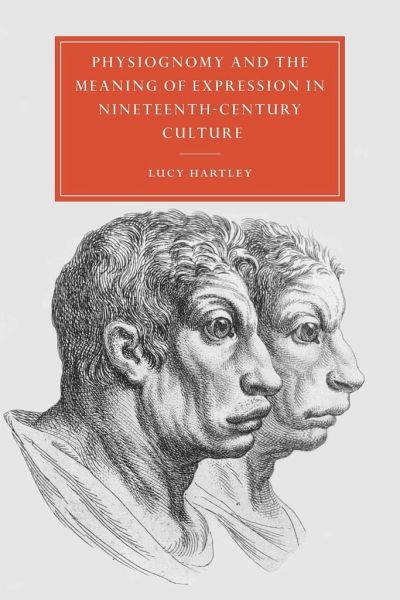
Physiognomy and the Meaning of Expression in Nineteenth-Century Culture
Versandkostenfrei!
Versandfertig in 1-2 Wochen
49,99 €
inkl. MwSt.

PAYBACK Punkte
25 °P sammeln!
This is a study of the emergence of physiognomy as a form of popular science.In Physiognomy and the Meaning of Expression in Nineteenth-Century Culture, Lucy Hartley examines the emergence of physiognomy as a form of popular science. Physiognomy posited an understanding of the inner meaning of human character from observations of physical appearances, usually facial expressions. Taking the physiognomical teachings of Johann Caspar Lavater as a starting-point, Hartley considers the extent to which attempts to read the mind and judge character through expression can provide descriptions of human...
This is a study of the emergence of physiognomy as a form of popular science.
In Physiognomy and the Meaning of Expression in Nineteenth-Century Culture, Lucy Hartley examines the emergence of physiognomy as a form of popular science. Physiognomy posited an understanding of the inner meaning of human character from observations of physical appearances, usually facial expressions. Taking the physiognomical teachings of Johann Caspar Lavater as a starting-point, Hartley considers the extent to which attempts to read the mind and judge character through expression can provide descriptions of human nature. She argues that the writings of Charles Bell, and the Pre-Raphaelites establish the significance of the physiognomical tradition for the study of expression whilst also preparing the ground for the rise of new doctrines for the expression of emotion by Alexander Bain and Herbert Spencer. She then demonstrates how the evolutionary explanation of expression proposed by Spencer and Charles Darwin is both the outcome of the physiognomical tradition and the reason for its dissolution.
Review quote:
"Hartley develops the significant point that physiognomical theories exquisitely reflect as well as motivate many aspects of culture. Historical studies such as hers thereby contribute to our understanding of human nature and experience within the context of modern Western history."
Journal of the History of the Behavioral Sciences
"Hartley makes her case elegantly and concisely."
Bulletin of the History of Medicine
"Effectively demonstrates the tentacular reach of physiognomy within Victorian culture."
Studies in English Literature
"This lucidly-written and useful book amply demonstrates how the blindnesses of physiognomy still offer insights into the nineteenth century and beyond."
Wordsworth Circle
Table of contents:
Illustrations; Acknowledgements; Introduction; 1. A science of mind?: theories of nature, theories of man; 2. The argument for expression: Charles Bell and the concept of design; 3. What is the character: the nature of ordinariness in the paintings of the Pre-Raphaelite Brotherhood; 4. 'Beauty of character and beauty of aspect': expression, feeling, and the contemplation of emotion; 5. Universal expressions: Darwin and the naturalisation of emotion; 6. The promise of a new psychology?; Bibliography; Index.
In Physiognomy and the Meaning of Expression in Nineteenth-Century Culture, Lucy Hartley examines the emergence of physiognomy as a form of popular science. Physiognomy posited an understanding of the inner meaning of human character from observations of physical appearances, usually facial expressions. Taking the physiognomical teachings of Johann Caspar Lavater as a starting-point, Hartley considers the extent to which attempts to read the mind and judge character through expression can provide descriptions of human nature. She argues that the writings of Charles Bell, and the Pre-Raphaelites establish the significance of the physiognomical tradition for the study of expression whilst also preparing the ground for the rise of new doctrines for the expression of emotion by Alexander Bain and Herbert Spencer. She then demonstrates how the evolutionary explanation of expression proposed by Spencer and Charles Darwin is both the outcome of the physiognomical tradition and the reason for its dissolution.
Review quote:
"Hartley develops the significant point that physiognomical theories exquisitely reflect as well as motivate many aspects of culture. Historical studies such as hers thereby contribute to our understanding of human nature and experience within the context of modern Western history."
Journal of the History of the Behavioral Sciences
"Hartley makes her case elegantly and concisely."
Bulletin of the History of Medicine
"Effectively demonstrates the tentacular reach of physiognomy within Victorian culture."
Studies in English Literature
"This lucidly-written and useful book amply demonstrates how the blindnesses of physiognomy still offer insights into the nineteenth century and beyond."
Wordsworth Circle
Table of contents:
Illustrations; Acknowledgements; Introduction; 1. A science of mind?: theories of nature, theories of man; 2. The argument for expression: Charles Bell and the concept of design; 3. What is the character: the nature of ordinariness in the paintings of the Pre-Raphaelite Brotherhood; 4. 'Beauty of character and beauty of aspect': expression, feeling, and the contemplation of emotion; 5. Universal expressions: Darwin and the naturalisation of emotion; 6. The promise of a new psychology?; Bibliography; Index.




